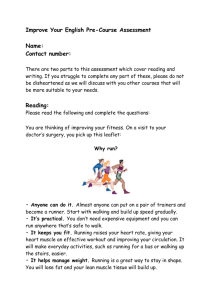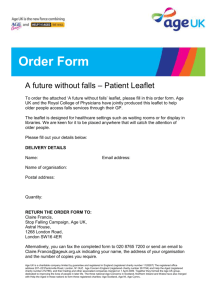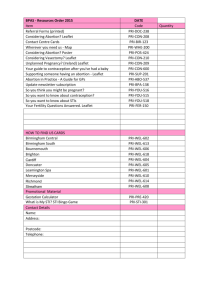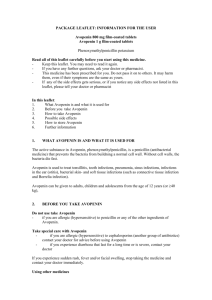Heart Failure - Beech Hill Medical Practice
advertisement
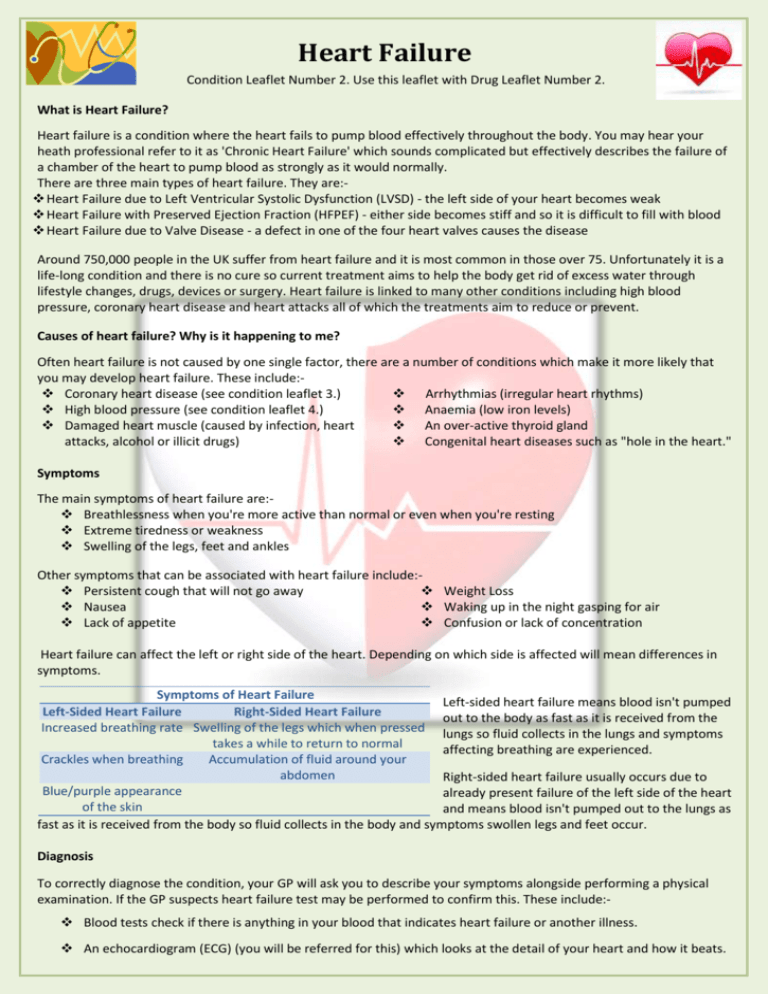
Heart Failure Condition Leaflet Number 2. Use this leaflet with Drug Leaflet Number 2. What is Heart Failure? Heart failure is a condition where the heart fails to pump blood effectively throughout the body. You may hear your heath professional refer to it as 'Chronic Heart Failure' which sounds complicated but effectively describes the failure of a chamber of the heart to pump blood as strongly as it would normally. There are three main types of heart failure. They are: Heart Failure due to Left Ventricular Systolic Dysfunction (LVSD) - the left side of your heart becomes weak Heart Failure with Preserved Ejection Fraction (HFPEF) - either side becomes stiff and so it is difficult to fill with blood Heart Failure due to Valve Disease - a defect in one of the four heart valves causes the disease Around 750,000 people in the UK suffer from heart failure and it is most common in those over 75. Unfortunately it is a life-long condition and there is no cure so current treatment aims to help the body get rid of excess water through lifestyle changes, drugs, devices or surgery. Heart failure is linked to many other conditions including high blood pressure, coronary heart disease and heart attacks all of which the treatments aim to reduce or prevent. Causes of heart failure? Why is it happening to me? Often heart failure is not caused by one single factor, there are a number of conditions which make it more likely that you may develop heart failure. These include: Coronary heart disease (see condition leaflet 3.) Arrhythmias (irregular heart rhythms) High blood pressure (see condition leaflet 4.) Anaemia (low iron levels) Damaged heart muscle (caused by infection, heart An over-active thyroid gland attacks, alcohol or illicit drugs) Congenital heart diseases such as "hole in the heart." Symptoms The main symptoms of heart failure are: Breathlessness when you're more active than normal or even when you're resting Extreme tiredness or weakness Swelling of the legs, feet and ankles Other symptoms that can be associated with heart failure include: Persistent cough that will not go away Weight Loss Nausea Waking up in the night gasping for air Lack of appetite Confusion or lack of concentration Heart failure can affect the left or right side of the heart. Depending on which side is affected will mean differences in symptoms. Symptoms of Heart Failure Left-sided heart failure means blood isn't pumped Left-Sided Heart Failure Right-Sided Heart Failure out to the body as fast as it is received from the Increased breathing rate Swelling of the legs which when pressed lungs so fluid collects in the lungs and symptoms takes a while to return to normal affecting breathing are experienced. Crackles when breathing Accumulation of fluid around your abdomen Right-sided heart failure usually occurs due to Blue/purple appearance already present failure of the left side of the heart of the skin and means blood isn't pumped out to the lungs as fast as it is received from the body so fluid collects in the body and symptoms swollen legs and feet occur. Diagnosis To correctly diagnose the condition, your GP will ask you to describe your symptoms alongside performing a physical examination. If the GP suspects heart failure test may be performed to confirm this. These include: Blood tests check if there is anything in your blood that indicates heart failure or another illness. An echocardiogram (ECG) (you will be referred for this) which looks at the detail of your heart and how it beats. If you are confirmed as having heart failure, your doctor will classify the level of the condition according to The New York Heart Failure Classification Scale; this places you in a category based on how much your physical exercise is limited by the condition. There are four stages. The stages range from stage I to stage IV and symptoms worsen on increasing stage. You may also have an idea of which stage you feel you are at already after experiencing your symptoms. New York Heart Association Classification Stage Symptoms I Heart disease but no limitations on physical activity II Mild limitations of ordinary activity (shortness of breath/angina pains) III Marked limitation in activity due to symptoms (struggles to walk short distances) IV Severe limitations, comfortable only at rest Treatment Treatment of heart failure involves a combination of lifestyle changes and medicines: Stopping smoking, eating a low-fat and high-fibre diet (including 5 portions of fresh fruit and vegetables daily and a mixture of carbohydrates, meat and oily fish), trying to limit your salt consumption to under 6g per day (this is about one teaspoonful), avoiding foods high in saturated fats (such as meat pies, cakes and butter) - this will also help you to maintain a healthy weight, keeping your alcohol levels in line with government targets of 14 units a week for women and 21 units a week for men and exercising often, all reduce the burden on your heart. If you stop smoking quickly after a heart attacks your risk drops to near that of a non-smoker. Medical treatment for heart failure can involve lots of different classes of drugs. Drugs for relief of symptoms are mainly diuretics such as furosemide. These aim to reduce the amount of water you are retaining in either your lungs or abdomen/ankles by passing it out in your urine. Other drugs are used to prevent the heart worsening and include ACE inhibitors such as lisinopril, beta blockers such as bisoprolol, and other drugs such as spironolactone, losartan, hydralazine and digoxin. For further detailed information including how these drugs work in heart failure, doses, side effects and interactions please refer to drug leaflet number 2 - drugs used to treat heart failure. Monitoring Needed Your GP will either yearly or 6 monthly ask you to come in for a blood pressure check, he should also check your cholesterol levels, how you are getting on with treatment and if your symptoms are improving. Further Information If you are confused about any information you have read or been given it is always beneficial to speak to a healthcare professional such as a doctor, pharmacist or nurse. Each of these people are specialists in different aspects of medicine and will always help to answer any questions you have about any aspect of your condition. If you feel you would like to read up on specific information about medicines used to treat heart failure or the condition itself these websites may be beneficial to you: British Heart Foundation -The British Heart Foundation is a charity that provides help and support to patients with CHD and heart failure. The information they provide can be very useful. Available at: http://www.bhf.org.uk/heart-health/conditions/heart-failure.aspx NICE - The Heart Failure Quick Reference Guide from the National Institute of Health and Clinical Excellence, the institution that initiates guidance for healthcare professionals for clinical conditions. Available at: http://www.nice.org.uk/guidance/CG108/QuickRefGuide Patient.co.uk. -This website aims to give patients a bit more insight into their conditions/medication in a language they can understand. It is available at: http://www.patient.co.uk/health/Heart-Failure.htm NHS Choices. -Another website that aims to provide patients with relevant understandable information. Available at: http://www.nhs.uk/conditions/Heart-failure/Pages/Introduction.aspx This leaflet has been developed in conjunction with the patients and GPs of Beech Hill Medical Centre, Wigan and Liverpool John Moores University, Liverpool. Drugs Used to Treat Heart Failure Drug Leaflet Number 2. Use with Condition Leaflet Number 2. The information contained in this leaflet should provide you with in-depth detail on the medicines you will be or have already been, prescribed for the treatment heart failure. You should refer to this leaflet after reading condition leaflet 2 - Heart Failure, which aims to give you a detailed overview of the condition. The drugs named are those most favoured by the general practitioners at Beech Hill Medical Centre, Wigan. As with many medical conditions the treatment for heart failure is in stages. If you remain symptomatic while on first-line therapy, your GP or specialist may choose to progress to second-line therapy where other drugs are added in or if surgery is an option this is sometimes used. First-Line Therapy If you have been diagnosed with heart failure and are suffering from a lot of water retention either in your lungs or in your legs/ankles you may be prescribed a diuretic for example furosemide. This drug works to eliminate the excess water from your body by excreting it from the body in your urine. You must take it first-thing in the morning, especially if you are planning on leaving the house as it will make you need to go to the toilet soon after taking it. The dose varies depending on the amount of water-retention you are suffering from. As treatment your doctor will start you on two classes of drugs soon after diagnosis. The first class of drugs are called ACE inhibitors, these work by inhibiting an enzyme which acts to raise blood pressure. The two most commonly prescribed ACE inhibitors at your surgery are 'lisinopril' and 'ramipril'. The other class of drugs used alongside ACE inhibitors in first-line therapy are called beta blockers, these reduce the workload of the heart. The most commonly prescribed beta blocker at your surgery for this condition is bisoprolol. Second Line Therapy If your symptoms are not improving after trying the two drugs in first line therapy your doctor should refer you to doctor who specialises in this condition. The specialist doctor will assess you and may decide to add a third. At this stage he/she is presented with some choices; they could add a drug from a class called aldosterone antagonists known as spironolactone, he/she may also choose to prescribe you an angiotensin 2 receptor blocker or they may add in a drug combination called hydralazine plus a nitrate. Third-Line Therapy If you are still not responding as well as the doctors would like from any of the drugs described above another drug may be added. It is from a class of drugs known as cardiac glycosides and is called digoxin. This works by strengthening the force of your heart beat. The dose is usually ONE to be taken DAILY. Other Medication Because heart failure is linked with other conditions such as high blood pressure, coronary heart disease, stroke and heart attacks, it is important to keep your blood pressure at the right level and circulation flowing freely to prevent clots that could cause a heart attack. Additional medication from that discussed above will be added and may include: A calcium channel blocker - this drug helps to keep your blood pressure at a target of 140/90mmHg Dispersible or enteric coated aspirin 75mg - this drug helps keep your circulation flowing correctly A statin - this drug prevents fatty deposits building up inside your arteries by lowering your cholesterol level Calcium Channel Blockers These drugs work by blocking the calcium channels in your body. Calcium is important for muscles to contract so relaxing these muscles helps your veins and arteries to dilate lowering your blood pressure. There are lots of different calcium channel blockers, the one most used for high blood pressure at your surgery is amlodipine. The doses for calcium channel blockers can vary depending on whether you are prescribed an immediate-release tablet (one that releases drug as soon as you swallow it) or a controlled-release tablet (one that releases drug slowly throughout the day). Always check the label on the box when you receive your prescription from the pharmacy as to when to take your medication. Dispersible/Enteric Coated Aspirin 75mg This drug is what is known as an anti-platelet meaning it prevents your red blood cells and platelets collecting together and forming a clot which could get stuck in a blocked vein or artery causing a heart attack or stroke. This medication can irritate your stomach so you should take it with or just after food and the dose is ONE tablet to be taken DAILY, ideally in the morning with your breakfast. If for any reason you cannot take aspirin your GP will prescribe you a different antiplatelet such as clopidogrel or ticagrelor. Statin This drug prevents fatty deposits called atheroma building up your arteries causing them to narrow. It works by lowering your cholesterol and as cholesterol is produced at night you need to take it before you go to bed. The most commonly prescribed statin at your surgery is simvastatin. The dose is ONE tablet to be taken at NIGHT. Side Effects A very common side effect of ACE inhibitors is a dry cough. Many patients unfortunately suffer from this but if you feel it is impacting your life too much speak to your GP or pharmacist as there is an alternative class of drugs that help your heart in the same way that ACE inhibitors do but without causing you the dry cough. If it is tolerable but irritating you may find relief from a cough remedy such as simple linctus that should suppress the cough but doesn't interfere with your medication. Calcium channel blockers can cause headaches and dizziness, these are usually mild but if you are concerned, speak to your doctor or pharmacist. Statins can cause muscle aches and pains. These are usually manageable but if they become severe make an appointment to see your doctor as muscle wastage can develop which is a serious condition. Interactions Because of the way ACE inhibitors, angiotensin 2 receptor blockers and beta blockers work they can interact with medicines such as decongestants (these are found in many cold and flu remedies e.g. Sudafed and Lemsip). You should avoid using these decongestants if you are taking one of these types of medicines. Decongestants you can take include menthol preparations such as Albas Oil. These medicines can also interact with anti-inflammatories such as ibuprofen that are able to be bought over the counter and are present in many muscle rub preparations. Always tell your pharmacist if you are taking an ACE inhibitor, angiotensin 2 receptor blocker or a beta blocker before you buy anything over the counter. Statins interact with certain classes of antibiotics called macrolides and some antifungals. If you are prescribed clarithromycin, erythromycin or clindamycin or antifungals such as itraconazole, fluconazole or ketoconazole you should discontinue your statin whilst you are taking the course of antibiotics or antifungals. Some of these antifungals are found in many over-the -counter preparations for thrush so be cautious before purchasing one of these products. Statins also interact with grapefruit juice so you should avoid this if you take statins. Further Information If you feel you would like to read up on specific information about medicines used to treat heart failure these websites may be beneficial to you: Patient.co.uk This section of the website aims to provide patients with information on many classes of drugs in a language they can understand. Available at: http://www.patient.co.uk/dils.asp Electronic Medicines Compendium. This website isn't aimed at patients so you may find it complicated but provides the patient information leaflet found inside the box of a particular drug or a summary of the product characteristics according to the manufacturer of the medicine. Available at: http://www.medicines.org.uk/emc/ This leaflet has been developed in conjunction with the patients and GPs of Beech Hill Medical Centre, Wigan and Liverpool John Moores University, Liverpool.
